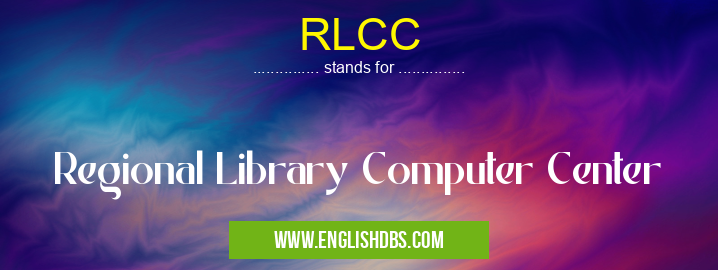What does RLCC mean in LIBRARIES
Regional Library Computer Center (RLCC) is an abbreviation used in the field of library science to refer to a computing facility that provides services to libraries in a particular region. RLCCs typically offer a range of services that include: computer hardware and software support, data processing, network connectivity, and training.

RLCC meaning in Libraries in Academic & Science
RLCC mostly used in an acronym Libraries in Category Academic & Science that means Regional Library Computer Center
Shorthand: RLCC,
Full Form: Regional Library Computer Center
For more information of "Regional Library Computer Center", see the section below.
Services offered by RLCCs
RLCCs provide a range of services to libraries in their region, including:
- Computer hardware and software support: RLCCs provide libraries with access to computers, software, and other hardware resources. They also provide technical support to libraries to help them troubleshoot any problems that they may encounter with their technology.
- Data processing: RLCCs can assist libraries with data processing tasks, such as cataloging, circulation, and interlibrary loan. They can also provide libraries with access to databases and other resources that can be used for research and other purposes.
- Network connectivity: RLCCs can provide libraries with network connectivity, allowing them to connect to the Internet and other resources. They can also provide libraries with access to online catalogs and other resources that can be used by patrons.
- Training: RLCCs can provide training to library staff on a variety of topics, including computer software, data processing, and network connectivity. They can also provide training on library-specific topics, such as cataloging and circulation.
Essential Questions and Answers on Regional Library Computer Center in "SCIENCE»LIBRARIES"
What is the Regional Library Computer Center (RLCC)?
The RLCC is a centralized facility that provides library computer services to a group of libraries in a region. These services may include cataloging, circulation, interlibrary loan, and reference.
What are the benefits of using an RLCC?
There are many benefits to using an RLCC, including:
- Economies of scale: RLCCs can provide services more cost-effectively than individual libraries could on their own.
- Access to a wider range of resources: RLCCs typically have access to a wider range of resources than individual libraries, including databases, software, and expertise.
- Improved efficiency: RLCCs can help libraries improve their efficiency by automating tasks and streamlining workflows.
What services do RLCCs typically provide?
RLCCs typically provide a range of services, including:
- Cataloging: RLCCs can catalog books, DVDs, and other materials for libraries.
- Circulation: RLCCs can manage the circulation of materials between libraries.
- Interlibrary loan: RLCCs can facilitate the interlibrary loan of materials between libraries.
- Reference: RLCCs can provide reference services to library patrons.
How do I access RLCC services?
To access RLCC services, you will need to contact your local library. Your library will be able to provide you with information on how to access the RLCC's services.
Final Words: RLCCs play an important role in supporting libraries in their region. They provide libraries with access to technology, resources, and training that can help them to improve their services to patrons.
RLCC also stands for: |
|
| All stands for RLCC |
